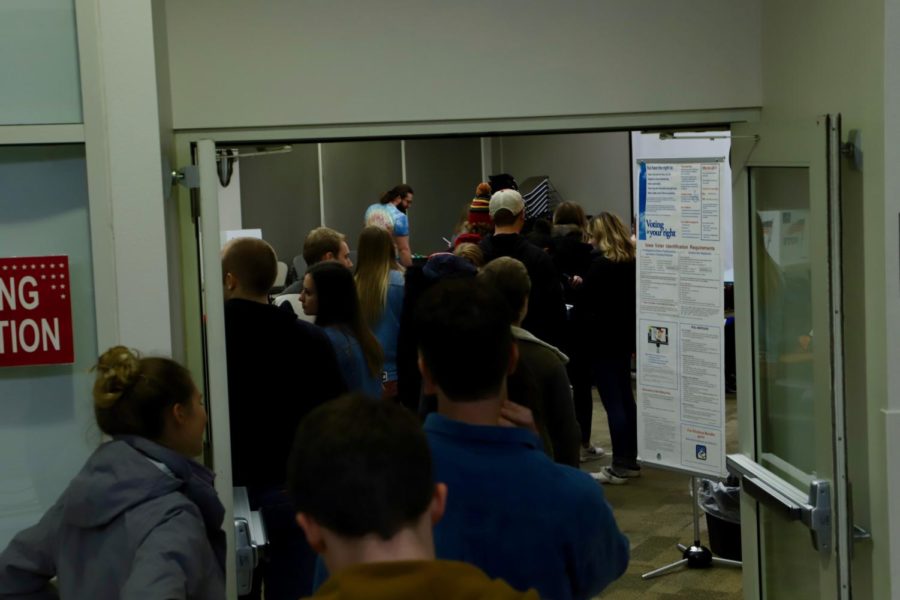Parts of voter ID law ruled unconstitutional
Patrick Schmidt/Iowa State Daily
Iowa State students go into the polling location in Buchanan Hall to cast their vote in the midterm elections Nov. 6.
October 2, 2019
Editor’s Note: A previous version of this story incorrectly said the judge had ruled absentee ballots can be issued without an identification number. The story has been updated to accurately reflect the judge’s ruling. The Daily regrets this error.
An Iowa judge ruled voter ID laws are permissible under the Iowa Constitution on Tuesday.
Under the language of the law, voters were required to show certain methods of identification, auditors were allowed to reject ballots if voter’s signatures did not appear to match the signatures on record and voters were required to provide identification numbers on absentee ballot applications.
Taylor Blair, a senior in industrial design, along with the League of United Latin American Citizens of Iowa, sued Iowa Secretary of State Paul Pate, saying they believed the law’s language to be unconstitutional.
“I’m happy that the things the judge permanently enjoined were permanently enjoined, for example the signature matching and ID numbers,” Blair said.
Judge Joseph Seidlin ruled the state can require voters to have proper identification in order to vote, but threw out the signature matching provision of the law as unconstitutional.
“I think the ID law hurts people. It makes it harder to vote — young people, people of color, elderly people. I really wish the ID [portion of the] law would have been found unconstitutional as well,” Blair said.
Seidlin’s ruling rejected those arguments.
“The evidence presented simply did not demonstrate that the burden on young voters, old voters, female voters, minority voters, poor voters and voters who are Democrats to show an approved form of identification at the polls is appreciably greater than the rest of the population,” Seidlin said in his ruling.
Pate released a statement on the ruling on Twitter.
My statement on our victory today in District Court upholding #VoterID at the polls and on absentee ballot requests: https://t.co/L9C9HbKzPz pic.twitter.com/IwcXZSedHe
— Iowa Sec. of State (@IowaSOS) 1 October 2019
“This ruling is a victory for election integrity. My goal has always been to make it easy to vote, but hard to cheat,” Pate said. “Iowans have overwhelmingly voiced their support for Voter ID and this law ensures voters will be asked to provide identification before casting their ballot.”
At least one presidential campaign weighed in on the ruling, with Iowa Rep. Chris Hall, D-Sioux City, saying in a statement for the Beto O’Rourke campaign the ruling was a victory for Iowans.
“Judge Seidlin’s ruling is a victory for Iowans and our constitutional right to vote,” Hall said. “Republicans across the country have fought to restrict access to the ballot box, and as president, Beto O’Rourke will ensure everyone’s voices are heard in our democracy.”
Not all public officials in Iowa are in agreement with Pate.
Voter identification laws work to reduce voter turnout, said Rep. Beth Wessel-Kroeschell, D-Ames.
“The ACLU, NAACP, Disability Rights and AARP were all opposed to this bill because it disenfranchised minorities, young people, the disabled and the elderly,” Wessel-Kroeschell said.
It is a deeply flawed bill, as parts of the bill say the secretary of state was to send a special voter ID to anyone that is registered to vote but does not have a driver’s licence, Wessel-Kroeschell said.
“My constituent, a male ISU student from Wisconsin, did not have an Iowa Driver’s license. He did not receive a voter ID because there is another Taylor Blair, a woman who lives in Iowa, who does have an Iowa driver’s license,” Wessel-Kroeschell said.
Wessel-Kroeschell said this law is voter suppression, as several years ago, the secretary of state’s office spent tax-payer dollars adding up to $86,000 and found no instances of voter fraud.
“Iowa and the U.S. do have a problem with voter turnout. We should encourage Iowans to vote, including our students, minorities, disabled and elderly,” Wessel-Kroeschell said.







